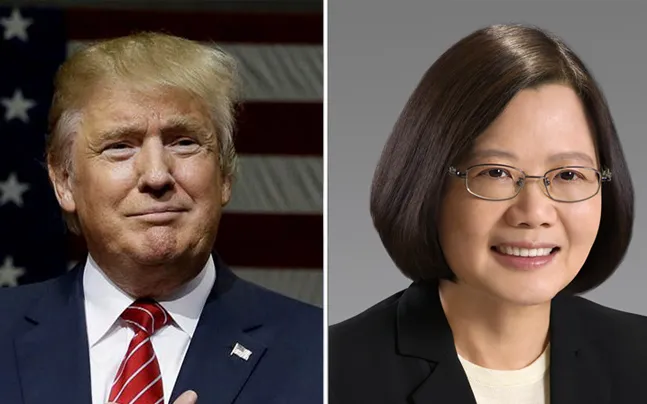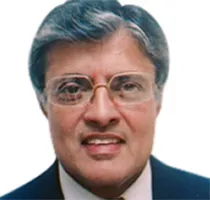-
CENTRES
Progammes & Centres
Location
It appears that the phone call was planned well in advance and was facilitated by Bob Dole, a former Republican Senator whose law firm has professional links with the Taipei Economic and Cultural Representative Office in the US.

A twelve minute telephonic conversation between the US President-elect, Donald Trump, and the President of Taiwan Tsai Ing-Wen on 3 December has triggered a serious diplomatic issue between the United States and the People's Republic of China (PRC). One side calls it a mere courtesy call while the other sees motives behind the move.
Strangely enough, the initial reaction of Beijing was rather muted with China’s ire targeted towards Taiwan. Foreign Minister Wang Yi said that "Taiwan played a little trick on the President-elect." Later, Foreign Office Spokesman Lu Kang said that Beijing has protested to the Trump team. The US Vice President-elect, Mike Pence, downplayed the whole episode. In the ABC's This Week programme, he called it "just a courtesy, simply accepting congratulations from the democratically elected leader of Taiwan."
The matter may have ended there but for some tweets by Trump over the weekend. These seem to have been provoked by his objection to the presumption that he has to take China's approval to talk to President Tsai Ing-Wen. Hence, he asked in his tweets: "Did China ask if it was okay to devalue their currency, or build military complexes in the South China Sea?" It also turned out that the telephonic conversation included exchanges on China and stability in the Asia Pacific. Another irritant for the Chinese was Trump’s reference to Tsai as the President of Taiwan which is taboo for the PRC. The only acceptable term for them is the "leader" of Taiwan.
The subsequent reactions from Beijing began to get stronger and stronger. A commentary in the overseas edition of the government controlled People's Daily said that "creating trouble for China-US relations is just creating trouble for China itself." It went on to warn that "if such petty tricks are allowed to go unanswered, Beijing could expect to see more of these provocations once he (Trump) is in office." Beijing is fully conscious of the strident anti-China posture that Trump took during his campaign and is still assessing how much of the rhetoric will be toned down after 20 January.
It appears that the phone call was planned well in advance and was facilitated by Bob Dole, a former Republican Senator whose law firm has professional links with the Taipei Economic and Cultural Representative Office in the US.
The initial subdued reaction of the government drew heavy criticism in the Chinese social media, building up pressure on the government to do a course correction. This is hardly surprising given the fact that Taiwan is a very sensitive issue for all Chinese who jealously guard the 'One-China' principle. It is the result of the sustained propaganda that they have heard over generations. It was a case of whipped up nationalism reacting to influence government decisions.
The Taiwan question (a term which PRC government hates: the politically correct term is "Taiwan issue") dates back to 1979 when the US, following the historic visit of President Richard Nixon to Beijing, broke diplomatic relations with Taiwan and recognised PRC. US accepted the so-called "One China Policy" as enunciated by Beijing. As per this understanding, US agreed not to act in any way which will even remotely imply a sovereign or independent status for Taiwan. However, because of historical reasons, commercial and cultural ties were continued. The most important aspect was the arms sales to augment the island's defence capabilities which have been routinely objected to by China. US also agreed not to encourage moves towards independence of Taiwan with a nuance that they would not discourage it either if the people of Taiwan wanted it. PRC, on its part, has not given up its options on the use of force to achieve reunification if needed. Though the preference is to achieve this through peaceful dialogue, Beijing has said that force will be used if:
The election of Tsai Ing-Wen of the Democratic Progressive Party (DPP) earlier this year has increased the tensions as she came to power on a platform of keeping a distance from PRC as opposed to her predecessor, President Ma Ying-jeou of the Kuomintang (KMT) who was seen as getting too close to Beijing.
There is wide spread speculation as to whether this was a diplomatic faux-pas, a one-off gesture or a calculated move. Considering that the call was pre-arranged by responsible persons, the faux-pas element can be ruled out. Trump's strong statements during his campaign suggest that it may not be a one-off gesture. Some Republicans have argued that it is time to introduce an element of "uncertainty" in US’s One China Policy. To add to the speculation, Mike Pence made an interesting remark. When asked about the implications of the phone call on One China Policy, he said: "We will deal with that after January 20th." The New York Times quoted some Republicans as calling it "improvisational diplomacy" as part of a deliberate strategy to recalibrate US-China relations.
Chinese diplomacy has been based on the principle of incrementalism. It is about gradual and incremental accretion of leverages vis-à-vis others. At the same time, China opposes any such incremental dilution in the accepted positions favourable to them. There is paranoia about any nuance in the accepted Chinese stand. What China fears is a domino effect if they give in to other interpretations. This holds true for Taiwan and Tibet. It is a strange coincidence that two weeks before the phone call incident, China had to face another diplomatic embarrassment; in this case, it was because of Tibet. The Dalai Lama had a much publicised visit to Mongolia despite protests and warnings from Beijing. This was his ninth visit to that country where the entire population worships him as an incarnation of the Buddha. After the visit, China came down heavily on the landlocked country by banning its trucks from entering it and increasing the tariffs.
There is no doubt that under Trump, US-China relations would witness some recalibration. Considering the existing interdependence, it would be interesting to see how far each side can and will go.
The views expressed above belong to the author(s). ORF research and analyses now available on Telegram! Click here to access our curated content — blogs, longforms and interviews.

H.H.S. Viswanathan was a Distinguished Fellow at ORF and a member of the Indian Foreign Service for 34 years. He has a long and diverse ...
Read More +